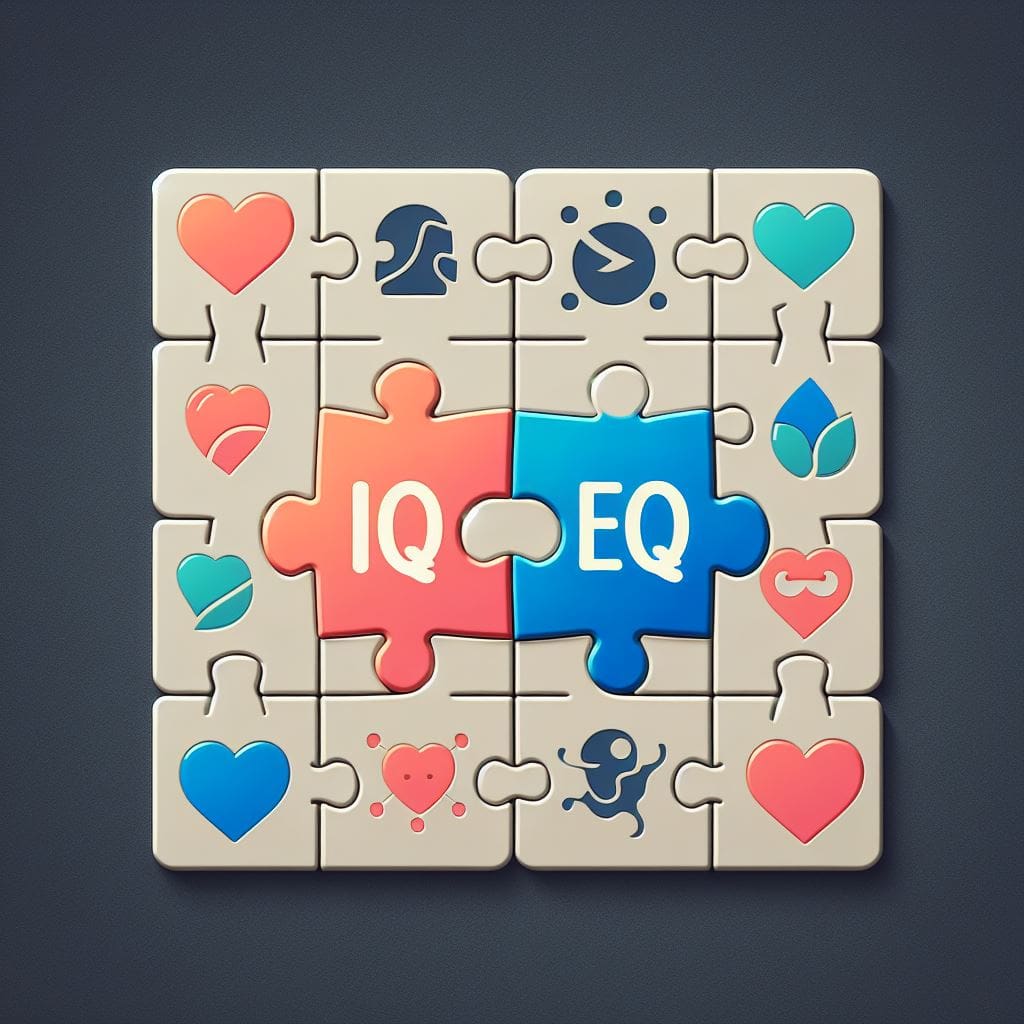
In leadership development, there’s an ongoing debate: what’s more important, intelligence quotient (IQ) or emotional quotient (EQ)? The answer, like most things in life, isn’t so black and white.
Both IQ and EQ play crucial roles in shaping effective leaders, and their interplay is what truly propels individuals towards greatness.
This article tries as much as possible to simplify the understanding of IQ and EQ, exploring their definitions, their roles in leadership, and how they work together to create exceptional leaders.
Understanding Intelligence Quotient (IQ):
IQ, or Intelligence Quotient, is a score obtained from standardized tests designed to assess cognitive abilities. These tests measure various aspects of intelligence, including:
- Logical reasoning: The ability to analyze information, identify patterns, and draw sound conclusions.
- Problem-solving: The capacity to find solutions to challenges in a systematic and effective manner.
- Spatial awareness: The ability to understand and manipulate spatial relationships.
- Verbal comprehension: The skill of understanding and using language effectively.

The Value of IQ in Leadership:
Leaders with high IQs excel at:
- Strategic thinking: They can analyze complex situations, develop long-term plans, and anticipate potential challenges.
- Decision-making: They can weigh options, assess risks and rewards, and make sound choices under pressure.
- Learning new things: They can quickly grasp complex concepts and adapt to changing environments.
However, IQ alone doesn’t guarantee successful leadership development. Imagine a brilliant chess player who can strategize flawlessly but lacks the emotional intelligence to connect with their teammates. This is where EQ steps in.
Understanding Emotional Intelligence (EQ):
EQ, or Emotional Intelligence, refers to a set of abilities that enable individuals to understand, use, and manage their own emotions effectively, while also being sensitive to the emotions of others. Key components of EQ include:
- Self-awareness: Recognizing your own emotions and how they influence your thoughts and actions.
- Self-regulation: Managing your emotions in healthy ways, even in challenging situations.
- Motivation: Maintaining a positive attitude and drive to achieve your goals.
- Empathy: The ability to understand and share the feelings of others.
- Social skills: Building and maintaining positive relationships, including effective communication and conflict resolution.

The Power of EQ in Leadership:
Strong leadership development hinges on more than just intellectual prowess. Leaders with high EQ are adept at:
- Motivation and inspiration: They can ignite passion and enthusiasm in their team members.
- Building trust and rapport: They foster strong relationships based on mutual respect and understanding.
- Conflict resolution: They can navigate disagreements constructively and find solutions that satisfy everyone involved.
- Emotional leadership: They create a positive and supportive work environment where people feel valued and respected.
How IQ and EQ Work Together in Leadership development
Imagine IQ as the raw power of a car engine. It provides the potential for speed and performance. However, without a skilled driver (EQ) at the wheel, that power can be dangerous and lead to accidents.

Here’s how IQ and EQ work together to create exceptional leaders:
- IQ fuels strategic thinking, while EQ helps translate that strategy into action by motivating and aligning the team.
- IQ provides excellent problem-solving skills, while EQ helps navigate the emotional aspects of challenges, like team member anxieties or disagreements.
- IQ fosters innovation and new ideas, while EQ ensures those ideas are communicated effectively and gain team buy-in.
Developing Your Leadership Potential:
The good news is that both IQ and EQ are not fixed traits. While some people may have a natural predisposition towards one or the other, these skills can be developed and honed through dedicated effort.
Here are some tips:
Enhancing IQ:
- Challenge Yourself: Continuously engage in activities that stimulate your cognitive abilities, such as learning new skills, solving puzzles, or reading challenging books.
- Sharpen Your Analytical Skills: Practice critical thinking exercises, logical reasoning puzzles, and analytical frameworks to strengthen your problem-solving approach.
- Engage in Active Learning: Don’t just passively consume information. Take notes, ask questions, and actively participate in discussions to solidify your understanding.
Developing EQ:
- Practice Self-Awareness: Pay attention to your emotions and how they influence your behavior. Mindfulness practices like meditation or journaling can be helpful tools.
- Develop Emotional Regulation Skills: Learn techniques to manage stress, control anger outbursts, and maintain composure under pressure. Deep breathing exercises and relaxation techniques can be beneficial.
- Empathy Building: Actively listen to others, try to understand their perspectives, and be attuned to their emotional cues.
- Develop Strong Communication Skills: Work on clarity, conciseness, and active listening in your interactions. Practice giving and receiving constructive feedback effectively.
- Seek Feedback: Ask trusted colleagues or mentors for honest feedback on your emotional intelligence. This can reveal blind spots and areas for improvement.
Leadership Development Programs:
Some leadership development programs specifically focus on fostering both IQ and EQ skills. These programs often incorporate:
- Case studies and simulations: Participants can apply their analytical skills to real-world scenarios and practice emotional intelligence in simulated leadership situations.
- Emotional intelligence assessments: These assessments can help individuals identify their strengths and weaknesses in key EQ areas.
- Mentorship and coaching: Mentors or coaches with strong leadership experience can provide personalized guidance and feedback on both IQ and EQ development.
The Final Word:
Finding the Balance in Effective Leadership Development
While there’s no one-size-fits-all formula for leadership success, a strong foundation in both Intelligence Quotient and Emotional Quotient is undeniable.
By understanding your own strengths and weaknesses in these areas, and actively pursuing development opportunities, you can create a powerful synergy between your intellectual prowess and emotional intelligence.
This dynamic duo will equip you to navigate the complexities of leadership development, build strong teams, and achieve remarkable results.
Remember: Leadership development is a journey, not a destination. Embrace continuous learning, strive to improve both your IQ and EQ, and inspire your team to reach their full potential.



